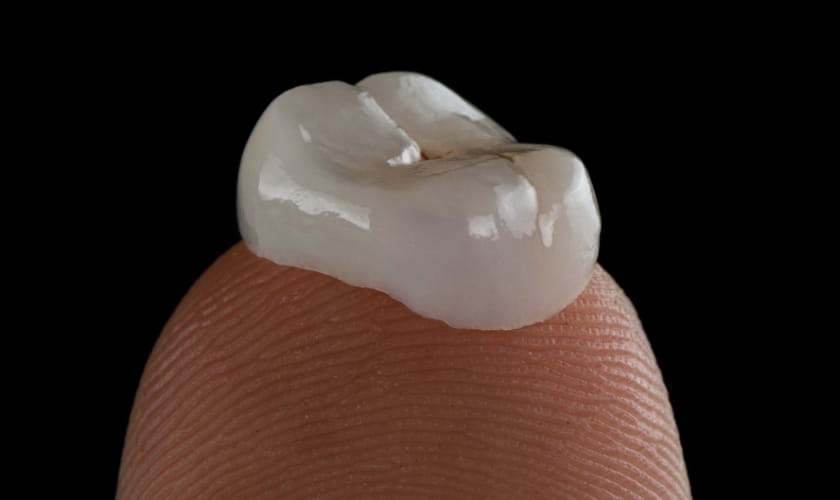Dental crowns are durable and designed to protect and strengthen teeth that have been damaged or weakened. However, despite their resilience, dental crowns can occasionally break, crack, or become dislodged. When this happens, it can be alarming and uncomfortable, but knowing what steps to take, can help you manage the situation effectively.
This guide will walk you through what to do when your dental crown breaks, including immediate actions, when to seek professional help, and how to prevent future issues.
Know About Dental Crowns
A dental crown is a cap that covers a damaged or weakened tooth. It can be made from various materials, including porcelain, metal, or a combination of both. Crowns are often used to:
- Restore a severely decayed tooth
- Replace a large filling
- Cover a cracked or chipped tooth
- Improve the appearance of a discolored or misshapen tooth
Common Causes of Dental Crown Breakage
Several factors can contribute to a broken dental crown, including:
- Chewing on hard foods: Biting into hard objects, such as nuts, candy, or ice, can put excessive stress on a crown and cause it to crack or break.
- Grinding or clenching teeth: This habit can apply significant pressure to your teeth and crowns, leading to wear and tear.
- Dental trauma: A blow to the face or mouth can cause a crown to fracture or become dislodged.
- Poor oral hygiene: Neglecting to brush, floss, and see your dentist regularly can increase the risk of tooth decay and gum disease, which can weaken the underlying tooth and contribute to crown failure.
What to Do If Your Crown Breaks?
If your dental crown breaks, it’s important to see your dentist as soon as possible. Ignoring a broken crown can lead to more serious dental problems, such as tooth decay, infection, or even tooth loss.
While waiting to see your dentist, you can take the following steps:
- Avoid chewing on the affected tooth: This will help prevent further damage and discomfort.
- Rinse your mouth with warm salt water: This can help keep the area clean and reduce the risk of infection.
- Over-the-counter pain relief: If you’re experiencing pain, you can take an over-the-counter pain reliever, such as ibuprofen or acetaminophen.
Treatment Options for a Broken Crown
Your dentist will examine your mouth and suggest the best treatment based on the extent of the damage. Possible treatment options include:
- Crown Repair: If the crown is only slightly damaged, your dentist may be able to repair it. This could involve smoothing out small chips or cracks or re-bonding the crown to the tooth.
- Crown Replacement: If the crown is significantly damaged or can’t be repaired, your dentist will likely recommend replacing it. This process involves taking an impression of your tooth to create a new crown, which may take a few days to complete. In the meantime, your dentist may provide you with a temporary crown to protect the tooth.
- Tooth Treatment: If the tooth underneath the crown has been damaged or decayed, your dentist may need to treat it before placing a new crown. This could involve a root canal, filling, or other restorative work.
Preventing Future Crown Breakage
To help prevent your dental crowns from breaking, follow these tips:
- Avoid Hard and Sticky Foods: Hard foods like ice, nuts, and hard candies, as well as sticky foods like caramel and chewing gum, can put extra pressure on your crowns, increasing the risk of breakage.
- Regular Brushing and Flossing: Keeping your teeth and gums healthy can help maintain the integrity of your crowns. Brush twice a day and floss daily to remove plaque and food particles that can cause decay or gum disease.
- Regular Dental Checkups: Visit your dentist regularly for dental exams and checkups. Your dentist can monitor the condition of your crowns and address any issues before they become serious.
- Wear a mouthguard: If you grind your teeth at night or participate in contact sports, wearing a mouthguard can protect your crowns from excessive pressure or trauma.
By following these tips and seeking prompt dental care when needed, you can help your dental crowns last longer and maintain a healthy smile. A broken dental crown can be distressing, but with the right steps, you can manage it effectively. Protect your tooth, manage any pain, and see your dentist immediately for professional evaluation and treatment. Proper care and prevention can minimize the risk of future crown breakage and help you keep a healthy, confident smile.

